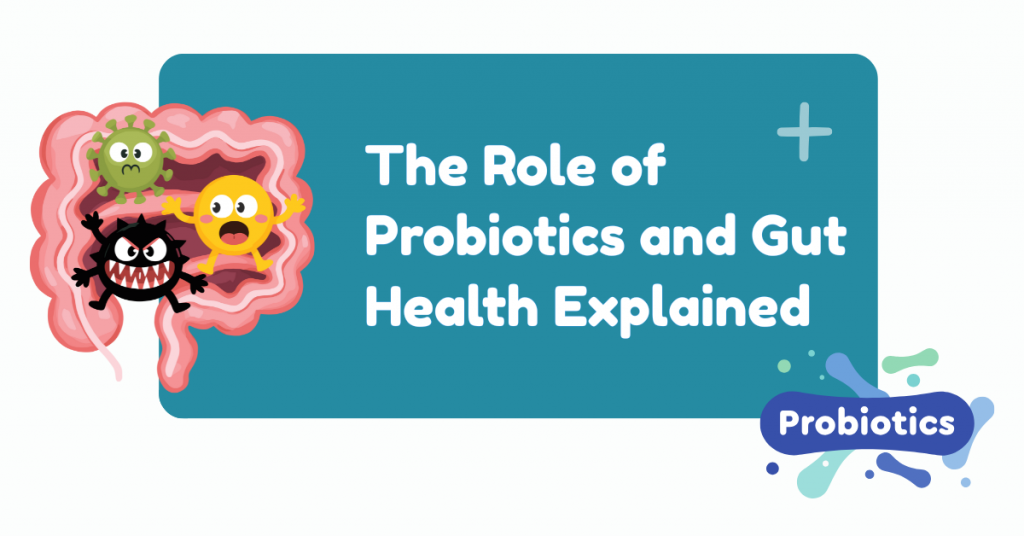Trillions of microorganisms, both beneficial and harmful, reside within your stomach. These microorganisms’ balance can have considerable effects on immunity, digestion, and even your mood.
Probiotics and gut health have gained a lot of attention in the scientific and wellness communities in recent years. Nevertheless, what are probiotics, and how do they support the health of your digestive system? Let’s explore.
What are Probiotics and Gut Health?
When talking about probiotics and gut health in substantial forms, probiotics are living microorganisms, mostly healthy or good bacteria, which support a balanced and healthy gut flora.
Probiotics, sometimes known as “good” or “friendly” bacteria, are naturally present in your intestines and can also be found in some meals and supplements.
According to the World Health Organization, probiotics are “live microorganisms which, when administered in adequate amounts, confer a health benefit on the host.”
Essentially, they support improved digestion, nutrient absorption, and general wellness by assisting your body in maintaining the proper balance between beneficial and detrimental microorganisms, which is essential for probiotics and gut health.
Common probiotic strains include:
- Lactobacillus, which is present in yogurt and fermented foods and aids in the digestion of lactose while preventing diarrhea.
- Bifidobacterium lowers inflammation in the stomach and boosts the immune system.
- A helpful yeast, Saccharomyces boulardii that aids in reestablishing gut flora following antibiotic use.
How Do Probiotics Work in the Gut?
We are all aware that our digestive tract is a complicated ecosystem. Digestive problems like bloating, constipation, or diarrhea can occur when bad bacteria exceed good ones because of stress, a poor diet or lifestyle, prolonged or extended sickness, or antibiotic usage.
Probiotics function and assist in the following ways:
- Microbiota balance: Probiotics fight off pathogenic bacteria for nutrients and gut wall adhesion sites. This stops infections from growing too much.
- Strengthening the Gut Barrier: They improve the integrity of the gut lining, which lowers the possibility of toxins and infections getting into the circulation, a condition called “leaky gut.”
- Changing Immune Response: Our gut contains over 70% of our immune system. By interacting with immune cells, probiotics enhance general immunity and encourage anti-inflammatory reactions.
- Creating Beneficial Compounds: Short-chain fatty acids (SCFAs), such as butyrate, are produced by specific probiotic strains and aid in the regulation of metabolism and intestinal cell nourishment.
To put it briefly, probiotics are essential for preserving the balance of your gut ecology and promoting healthy digestion.
What are the Benefits of Probiotics for Digestive Health?
Probiotics have numerous and well-established digestive advantages. Some benefits of probiotics for digestion. They promote gastrointestinal and general health in the following important ways:
- Prevent and treat Diarrhea: Probiotics are particularly useful in avoiding diarrhea brought on by illnesses or medicines. Antibiotics frequently destroy both good and bad bacteria, which causes an imbalance. Probiotic supplements hasten the restoration of healthy gut flora.
- Constipation: It has been demonstrated that some strains, such as Lactobacillus casei and Bifidobacterium lactis, enhance bowel regularity by softening stool and increasing frequency, particularly in people who suffer from chronic constipation.
- Improving Irritable Bowel Syndrome Symptoms: Gut bacterial imbalance is common in IBS patients. By reestablishing microbial equilibrium, probiotics have been shown in studies to reduce common IBS symptoms like gas, bloating, and stomach pain.
- Improving the Absorption of Nutrients: Probiotics help break down and absorb minerals like calcium, magnesium, and vitamins B and K. Your body will maximize the benefits of the food you eat if your gut flora is in good health.
- Promoting the Gut-Brain Link: New studies show a connection between mental health and gut health. By generating neurotransmitters like serotonin, probiotics may have an impact on mood and cognition, supporting the idea of the “gut-brain axis.”
- Strengthening Immunity: A robust immune system is correlated with intestinal health. Probiotics boost your body’s defenses against inflammation, allergies, and infections by increasing immune cells.
In conclusion, probiotics strengthen the stomach, immune system, and mind-body connection, which improves digestion and general wellness.
Signs You Might Need More Probiotics:
When your gut microbiota is out of equilibrium, your body frequently provides you with subtle clues. Here are some signs that suggest that your Gut microbiome equilibrium is out of order and intake of probiotics may be beneficial:
- Regular gas, indigestion, or bloating
- irregular bowel movements, such as diarrhea or constipation
- Exhaustion or poor vitality
- Skin conditions such as eczema or acne
- recurring illnesses or weakened defenses
- Cravings for sugar or inexplicable weight fluctuations
- Regular usage of antibiotics
Therefore, the aforesaid regular or multiple symptoms mean that it could be time to increase your use of probiotics through food or pills.
Foods That Naturally Contain Probiotics
Probiotic foods are among the simplest ways to boost your probiotic intake. Because fermentation naturally promotes the growth of good bacteria, these foods are perfect for promoting gut health and probiotics.
Some of the top food sources enriched with probiotics include:
- A traditional probiotic food prepared from fermented milk is yogurt. Select cultivars that have “live and active cultures.
- A tart fermented milk beverage that has more probiotics than yogurt is kefir.
- Sauerkraut is a fermented cabbage that is high in vitamins, fiber, and Lactobacillus.
- Kimchi is a hot Korean dish composed of spices and fermented vegetables.
- Miso is a traditional Japanese paste that is excellent in soups and sauces and is produced from fermented soybeans.
- Tempeh is a protein and probiotic-rich fermented soy food.
- A bubbly fermented tea that promotes a healthy digestive system is kombucha.
- Naturally fermented pickles, unlike vinegar-pickled ones, contain live cultures.
Probiotic Supplements: Are They Worth It?
Even if food sources are optimal, nutritional intake can occasionally fall short, particularly following antibiotic use, illness, or unhealthy eating patterns. Probiotic supplements may be useful in these situations.
Selecting an Appropriate Probiotic Supplement
While choosing a supplement or probiotics, remember these points:
- Strain Specificity: Different probiotic strains have distinct functions (e.g., Bifidobacterium infantis for IBS treatment, Lactobacillus rhamnosus GG for diarrhea prevention).
- Look for supplements with a minimum of 1–10 billion colony-forming units (CFUs) per serving.
- Storage Requirements: To preserve their effectiveness, certain probiotics must be refrigerated.
- Select goods that have undergone purity testing and are marked with a certain strain.
Yes, for a large number of people, but not all supplements are made equal. Targeted probiotics have been shown to enhance immunity, mood, and digestion.
Results, however, differ depending on the strain and the individual. It’s crucial to use them regularly and speak with a doctor, particularly if you have underlying medical issues.
Consider supplements to be an adjunct to a well-balanced probiotic diet, not a substitute.
Conclusion:
Almost every element of your health is impacted by the robust ecosystem that is your gut. Probiotics and gut health are closely connected. Probiotics can aid digestion, restore microbial balance, and promote general health when added to food or supplements.
The advantages of probiotics for digestion are numerous, ranging from preserving regular bowel motions to increasing immunity and decreasing inflammation. Whether you choose to drink kombucha or add yogurt to your breakfast, treating your gut with probiotics is an easy yet profound step toward improved health.
Therefore, consistency is the key to understanding how probiotics improve gut flora. Simple daily decisions, such as selecting the appropriate supplement or consuming fermented foods, can have a lasting impact on your general and digestive health.
To explore other wellness essentials, go through LifeRxPharmacy — your trusted online source for affordable, reliable healthcare products.
FAQs:
Can probiotics help with bloating and gas?
By reestablishing a healthy balance of gut bacteria, enhancing digestion, and inhibiting the growth of gas-producing germs in the intestines, probiotics can indeed help reduce bloating and gas.
How long does it take for probiotics to improve gut health?
Depending on the strain, dosage, and individual gut condition, probiotics may begin to improve gut health in as little as two to four weeks.
Are probiotics safe to take every day?
Yes, most people can safely take probiotics regularly. However, if you have a compromised immune system or other health issues, it’s preferable to use strains that have been clinically evaluated and to speak with a doctor.
Can you get enough probiotics from food alone?
Probiotics can be found in foods like yogurt, kefir, sauerkraut, and kimchi, but if these aren’t in your diet or you require greater amounts, pills might be helpful.
What happens to your gut when you start taking probiotics?
Although some people may initially suffer from moderate gas or changes in bowel habits, probiotics help balance gut bacteria, improve digestion, and may reduce bloating.
Do probiotics help with IBS or IBD?
Indeed, by lowering inflammation, enhancing the balance of gut flora, and alleviating pain, bloating, and irregular bowel movements, some probiotic strains can help reduce the symptoms of IBS and IBD.
When is the best time to take probiotics?
Probiotics work best when taken before or with meals since food increases the live bacteria’s survival in the gut and shields them from stomach acid.
Do antibiotics kill probiotics?
Antibiotics can kill probiotics because they eliminate both good and bad microorganisms. To assist in restoring gut equilibrium, probiotics should ideally be taken a few hours after antibiotics.
Can probiotics cause side effects or make symptoms worse at first?
Yes, while your gut adjusts, probiotics may initially cause moderate side effects like gas, bloating, or changes in stool. Usually transient, these symptoms go away in a few days.
References:
For more informational blogs, click here


